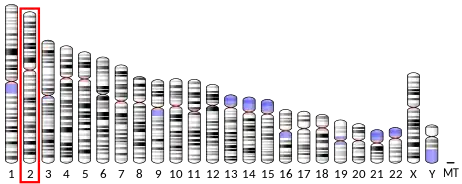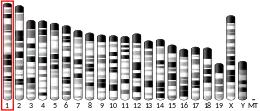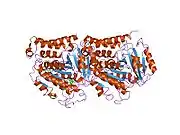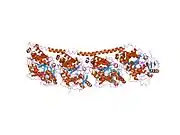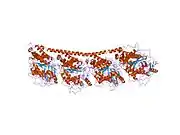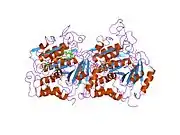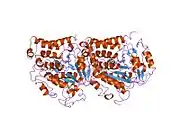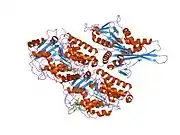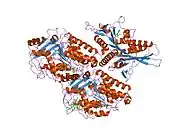| TUBA4A | |||||||||||||||||||||||||||||||||||||||||||||||||||
|---|---|---|---|---|---|---|---|---|---|---|---|---|---|---|---|---|---|---|---|---|---|---|---|---|---|---|---|---|---|---|---|---|---|---|---|---|---|---|---|---|---|---|---|---|---|---|---|---|---|---|---|
 | |||||||||||||||||||||||||||||||||||||||||||||||||||
| Identifiers | |||||||||||||||||||||||||||||||||||||||||||||||||||
| Aliases | TUBA4A, H2-ALPHA, TUBA1, ALS22, tubulin alpha 4a | ||||||||||||||||||||||||||||||||||||||||||||||||||
| External IDs | OMIM: 191110 MGI: 1095410 HomoloGene: 68496 GeneCards: TUBA4A | ||||||||||||||||||||||||||||||||||||||||||||||||||
| |||||||||||||||||||||||||||||||||||||||||||||||||||
| |||||||||||||||||||||||||||||||||||||||||||||||||||
| |||||||||||||||||||||||||||||||||||||||||||||||||||
| |||||||||||||||||||||||||||||||||||||||||||||||||||
| |||||||||||||||||||||||||||||||||||||||||||||||||||
| Wikidata | |||||||||||||||||||||||||||||||||||||||||||||||||||
| |||||||||||||||||||||||||||||||||||||||||||||||||||
Tubulin alpha-4A chain is a protein that in humans is encoded by the TUBA4A gene.[5]
Function
Microtubules of the eukaryotic cytoskeleton perform essential and diverse functions and are composed of a heterodimer of alpha and beta tubulin. The genes encoding these microtubule constituents are part of the tubulin superfamily, which is composed of six distinct families. Genes from the alpha, beta and gamma tubulin families are found in all eukaryotes. The alpha and beta tubulins represent the major components of microtubules, while gamma tubulin plays a critical role in the nucleation of microtubule assembly. There are multiple alpha and beta tubulin genes and they are highly conserved among and between species. This gene encodes an alpha tubulin that is a highly conserved homolog of a rat testis-specific alpha tubulin.[6]
Interactions
References
- 1 2 3 GRCh38: Ensembl release 89: ENSG00000127824 - Ensembl, May 2017
- 1 2 3 GRCm38: Ensembl release 89: ENSMUSG00000026202 - Ensembl, May 2017
- ↑ "Human PubMed Reference:". National Center for Biotechnology Information, U.S. National Library of Medicine.
- ↑ "Mouse PubMed Reference:". National Center for Biotechnology Information, U.S. National Library of Medicine.
- ↑ Villasante A, Wang D, Dobner P, Dolph P, Lewis SA, Cowan NJ (Jul 1986). "Six mouse alpha-tubulin mRNAs encode five distinct isotypes: testis-specific expression of two sister genes". Molecular and Cellular Biology. 6 (7): 2409–19. doi:10.1128/mcb.6.7.2409. PMC 367794. PMID 3785200.
- ↑ "Entrez Gene: TUBA4A tubulin, alpha 4a".
- ↑ Goo YH, Sohn YC, Kim DH, Kim SW, Kang MJ, Jung DJ, Kwak E, Barlev NA, Berger SL, Chow VT, Roeder RG, Azorsa DO, Meltzer PS, Suh PG, Song EJ, Lee KJ, Lee YC, Lee JW (Jan 2003). "Activating signal cointegrator 2 belongs to a novel steady-state complex that contains a subset of trithorax group proteins". Molecular and Cellular Biology. 23 (1): 140–9. doi:10.1128/MCB.23.1.140-149.2003. PMC 140670. PMID 12482968.
- ↑ Zumbrunn J, Kinoshita K, Hyman AA, Näthke IS (Jan 2001). "Binding of the adenomatous polyposis coli protein to microtubules increases microtubule stability and is regulated by GSK3 beta phosphorylation". Current Biology. 11 (1): 44–9. doi:10.1016/S0960-9822(01)00002-1. PMID 11166179. S2CID 15004529.
Further reading
- Desai A, Mitchison TJ (Jul 1998). "Tubulin and FtsZ structures: functional and therapeutic implications". BioEssays. 20 (7): 523–7. doi:10.1002/(SICI)1521-1878(199807)20:7<523::AID-BIES1>3.0.CO;2-L. PMID 9722999.
- Oakley BR (Dec 2000). "An abundance of tubulins". Trends in Cell Biology. 10 (12): 537–42. doi:10.1016/S0962-8924(00)01857-2. PMID 11121746.
- Dutcher SK (Feb 2001). "The tubulin fraternity: alpha to eta". Current Opinion in Cell Biology. 13 (1): 49–54. doi:10.1016/S0955-0674(00)00173-3. PMID 11163133.
- Kirsch J, Langosch D, Prior P, Littauer UZ, Schmitt B, Betz H (Nov 1991). "The 93-kDa glycine receptor-associated protein binds to tubulin". The Journal of Biological Chemistry. 266 (33): 22242–5. doi:10.1016/S0021-9258(18)54560-9. PMID 1657993.
- Dobner PR, Kislauskis E, Wentworth BM, Villa-Komaroff L (Jan 1987). "Alternative 5' exons either provide or deny an initiator methionine codon to the same alpha-tubulin coding region". Nucleic Acids Research. 15 (1): 199–218. doi:10.1093/nar/15.1.199. PMC 340405. PMID 3029670.
- Hall JL, Cowan NJ (Jan 1985). "Structural features and restricted expression of a human alpha-tubulin gene". Nucleic Acids Research. 13 (1): 207–23. doi:10.1093/nar/13.1.207. PMC 340985. PMID 3839072.
- Alexandrova N, Niklinski J, Bliskovsky V, Otterson GA, Blake M, Kaye FJ, Zajac-Kaye M (Sep 1995). "The N-terminal domain of c-Myc associates with alpha-tubulin and microtubules in vivo and in vitro". Molecular and Cellular Biology. 15 (9): 5188–95. doi:10.1128/MCB.15.9.5188. PMC 230766. PMID 7651436.
- Yamaguchi N, Fukuda MN (May 1995). "Golgi retention mechanism of beta-1,4-galactosyltransferase. Membrane-spanning domain-dependent homodimerization and association with alpha- and beta-tubulins". The Journal of Biological Chemistry. 270 (20): 12170–6. doi:10.1074/jbc.270.33.19551. PMID 7744867.
- Waterman-Storer CM, Karki S, Holzbaur EL (Feb 1995). "The p150Glued component of the dynactin complex binds to both microtubules and the actin-related protein centractin (Arp-1)". Proceedings of the National Academy of Sciences of the United States of America. 92 (5): 1634–8. Bibcode:1995PNAS...92.1634W. doi:10.1073/pnas.92.5.1634. PMC 42574. PMID 7878030.
- Lu Q, Luduena RF (Jan 1994). "In vitro analysis of microtubule assembly of isotypically pure tubulin dimers. Intrinsic differences in the assembly properties of alpha beta II, alpha beta III, and alpha beta IV tubulin dimers in the absence of microtubule-associated proteins". The Journal of Biological Chemistry. 269 (3): 2041–7. doi:10.1016/S0021-9258(17)42132-6. PMID 8294455.
- Paschal BM, Holzbaur EL, Pfister KK, Clark S, Meyer DI, Vallee RB (Jul 1993). "Characterization of a 50-kDa polypeptide in cytoplasmic dynein preparations reveals a complex with p150GLUED and a novel actin". The Journal of Biological Chemistry. 268 (20): 15318–23. doi:10.1016/S0021-9258(18)82472-3. PMID 8325901.
- Huby RD, Carlile GW, Ley SC (Dec 1995). "Interactions between the protein-tyrosine kinase ZAP-70, the proto-oncoprotein Vav, and tubulin in Jurkat T cells". The Journal of Biological Chemistry. 270 (51): 30241–4. doi:10.1074/jbc.270.51.30241. PMID 8530437.
- Marie-Cardine A, Kirchgessner H, Eckerskorn C, Meuer SC, Schraven B (Dec 1995). "Human T lymphocyte activation induces tyrosine phosphorylation of alpha-tubulin and its association with the SH2 domain of the p59fyn protein tyrosine kinase". European Journal of Immunology. 25 (12): 3290–7. doi:10.1002/eji.1830251214. PMID 8566014. S2CID 37614803.
- Peters JD, Furlong MT, Asai DJ, Harrison ML, Geahlen RL (Mar 1996). "Syk, activated by cross-linking the B-cell antigen receptor, localizes to the cytosol where it interacts with and phosphorylates alpha-tubulin on tyrosine". The Journal of Biological Chemistry. 271 (9): 4755–62. doi:10.1074/jbc.271.9.4755. PMID 8617742.
- Best A, Ahmed S, Kozma R, Lim L (Feb 1996). "The Ras-related GTPase Rac1 binds tubulin". The Journal of Biological Chemistry. 271 (7): 3756–62. doi:10.1074/jbc.271.7.3756. PMID 8631991.
- Tokito MK, Howland DS, Lee VM, Holzbaur EL (Aug 1996). "Functionally distinct isoforms of dynactin are expressed in human neurons". Molecular Biology of the Cell. 7 (8): 1167–80. doi:10.1091/mbc.7.8.1167. PMC 275970. PMID 8856662.
- Tian G, Lewis SA, Feierbach B, Stearns T, Rommelaere H, Ampe C, Cowan NJ (Aug 1997). "Tubulin subunits exist in an activated conformational state generated and maintained by protein cofactors". The Journal of Cell Biology. 138 (4): 821–32. doi:10.1083/jcb.138.4.821. PMC 2138046. PMID 9265649.
- Vaillant AR, Müller R, Langkopf A, Brown DL (May 1998). "Characterization of the microtubule-binding domain of microtubule-associated protein 1A and its effects on microtubule dynamics". The Journal of Biological Chemistry. 273 (22): 13973–81. doi:10.1074/jbc.273.22.13973. PMID 9593747.
This article incorporates text from the United States National Library of Medicine, which is in the public domain.
